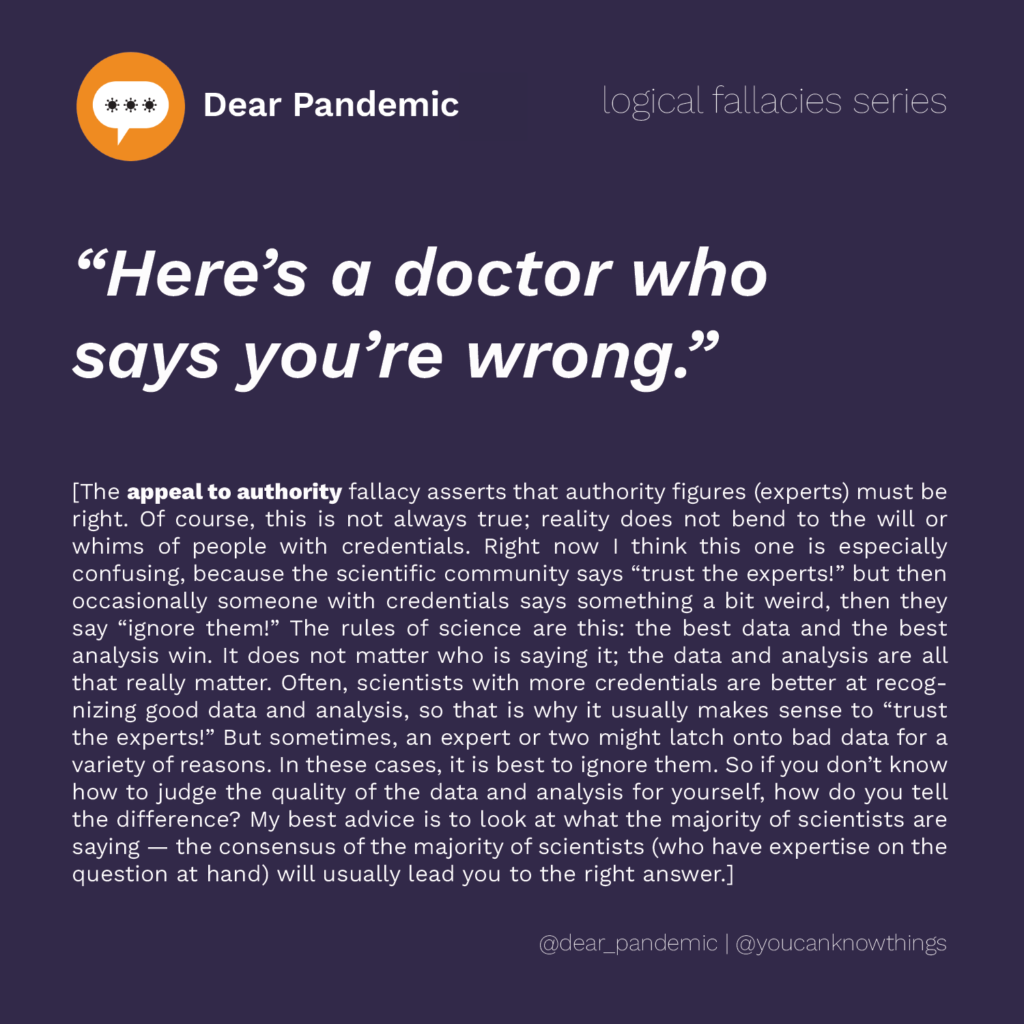At Dear Pandemic, we want to dish out science facts AND equip our readers with tools to make sense of data and science themselves.
In this series, Dr. Kristen Panthagani of You Can Know Things dissects some common logical fallacies that have led people astray during the pandemic.
Logical fallacies are common patterns of reasoning that seem true on the surface but have one or more critical flaws. At their root, many are oversimplifications–like a cognitive shortcut. They are appealing because they make something complex, like vaccine safety or the efficacy of masks, into something simple and easy to understand. However, this oversimplification often leaves out important details, leading to the wrong conclusions.
Note: Logical fallacies are common and used by people arguing both for and against nearly every pandemic topic. They are incredibly common and are NOT a sign of stupidity or lack of intelligence: they have tripped up nearly everyone at some point. And just because someone uses a fallacy in their argument doesn’t automatically mean they’re wrong — (that’s the fallacy fallacy!). It simply means they haven’t provided adequate evidence supporting their argument, but that evidence may in fact exist. It’s useful to recognize logical fallacies in our own thinking so we can make more accurate conclusions about the world around us.
⚠️The Appeal to Authority Fallacy
The first fallacy in this series is the appeal to authority fallacy, which falsely asserts that authority figures (experts) are always right. Of course, this is not always true; reality does not bend to the will or whims of experts. If this argument were actually true, then we would be at a logical impasse every time two experts disagreed, because both are experts therefore both have to be right, yet they are saying opposite things. Quite the conundrum.
Right now, this fallacy is especially confusing, because the scientific community says “trust the experts!” but then when an expert says something a bit weird, they say “ignore them!” The rules of science are this: the best data and the best analysis win. It does not matter who is saying it; the data and analysis are all that matter. Often, scientists with more credentials are better at recognizing good data and analysis, so that is why it usually makes sense to “trust the experts!” But sometimes, an expert or two might latch onto bad data for a variety of reasons (they got overly attached to their hypothesis and want to be right, they want an audience, clicks, or views, the science conflicts with their ideological views, they are speaking outside their area of expertise, they have a financial conflict of interest, etc.). In these cases, it’s best to ignore them, even though they have a fancy degree. A degree doesn’t prove someone is right; sound data does.
So, if you don’t know how to judge the quality of the data and analysis for yourself, how do you tell the difference? My best advice is to look at what the majority of scientists are saying — the consensus of the majority of scientists (who have expertise on the question at hand) will usually* lead you to the right answer.
*There are a few cases in history where the majority of scientists were wrong and the lone “crazy one” was right. Here is one of my favorite examples.
Stay safe and Stay Sane!

Further reading:
What do we do when experts disagree?
10 logical fallacies used in vaccine arguments


